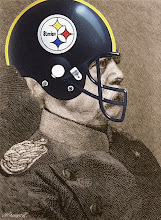With apologies to Jonathan Swift, I offer the following modest proposal to NFL Commissioner, Roger Goodell. Thanks to a number of currents flowing together (like noxious sewers), Goodell has the opportunity to alter football for the better.
First, marketers tell us that fans demand high-scoring games. Therefore, the NFL Rules Committee has changed the rules to ensure that the passing game is emphasized. Defensive backs cannot get near a wide receiver lest they draw a pass interference penalty. Likewise, the quarterback has become more sacrosanct than ever before. Even touching the quarterback below the knees or above the shoulders results in an immediate penalty. This is done, in part, to slow down the pass rush so the quarterback has more time to complete the long, down-field passes. Curiously, the emphasis on the passing game over the running game produces an undesired result (for advertisers) because games that are pass heavy take longer to play than running-dominated games because of clock stoppages. Advertisers want quick games. Rightly seeing that the average American has a one-hour attention span, they want the games to be over quickly so people are more likely to watch. (This, however, seems counterproductive because short games mean less overall advertising time, but I’m not in advertising). My solution will solve the nagging problem of long, low-scoring games.
Secondly, both the NFL owners and the NFL Players Association seem hell bent on destroying the goose that laid the golden egg. Football revenues are up so both sides are making more money than ever before. Unfortunately, neither side seems to be serious about renegotiating the Collective Bargaining Agreement (CBA) which the owners opted out of last year. The owners claim that sharing 60 per cent of their revenues with the players is unfair to the owners. Apparently, the owners believe they do more than 40 per cent of the work or that 40 per cent of the football fans are paying to see really, really good ownership. The owners also claim that many of them are losing money. However, they refuse to open their books and prove they are losing money. Meanwhile, the Players Association is led by a guy whose credentials to be the lead negotiator for the NFL players includes the facts that he is a lawyer, a lobbyist, and close friend of Barack Obama. He clearly knows a great deal about wheeling and dealing in Washington, but his policy of brinksmanship in labor negotiations is deeply suspect. In any event, both sides of multi-millionaires are hell bent on destroying football (just like the respective sides did with baseball), either by the owners locking out the players or the players going on strike, again.
Luckily, I have a solution to all the NFL’s problems. Reduce all teams to 11 players and one coach. This will save the owners a great deal of money. We’ll only need 11 offensive players to ensure that there is enough scoring to keep the marketers happy. The coach only needs to have a “magic wheel” of plays – think of Wheel of Fortune, but with football plays. For example, the coach might spin the wheel and the play is a thirty yard go route. The quarterback calls the play, the offensive line pass blocks (against nobody), the receivers run their routes (against nobody), and the quarterback completes the pass (hopefully). After the play, the solitary official spins his “magic wheel” of penalties. If there is no penalty, the play stands. If, for example, there is illegal contact downfield against the defense, ten yards gets tacked onto the play. If, for a different example, there is offensive holding called, the play comes back. It doesn’t matter that there are no defensive players on the field. The officiating this year proved that a penalty doesn’t need to occur to have been called, nor are blatant penalties called (just ask James Harrison). Sure, you may get a roughing the kicker penalty when there is no kicker on the team any more, but I think most fans would agree that my system has less room for mystery calls than the current system.
This plan saves the owners money, the marketers get short, high-scoring games, and, as an added benefit, we get better officiated games. In addition, all the fantasy football fans will be pleased. They won’t have to worry about the pesky problem of rooting for one particular team or worrying about their real team screwing up their fantasy team. Instead, they can just concentrate on the truly important question -- is a system that uses whole points or one that uses fractional points for yards gained more accurately reflective of reality. Obviously, the yards themselves are not reality. Now, if I could just find Mr Goodell’s phone number, we can get the ball rolling (or “magic wheel” spinning).
Sunday, February 7, 2010
Subscribe to:
Comments (Atom)
